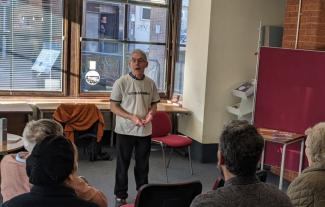
Talking about stammering at my local library

John Russell tells us how a chance encounter led to him giving a talk about stammering at Reading Central Library in January.
At the beginning of the year I bumped into a familiar face when I was in town. We exchanged pleasantries and the lady she was with said to me, "I remember you! You used to come along to the library and give talks about stammering".
I had indeed given talks at the library before, in the dim-and-distant past, but since covid raising awareness and funds for STAMMA had taken a back seat. The lady's words made me think and I felt motivated to do another talk to help people understand more about stammering.
So, a few days later, I went to Reading Central Library and asked if it would be possible to give another talk to anyone who wanted to come along. The person remembered me and said she was be happy for me to talk at one of its coffee mornings. The date was set for Monday 15th January 2024.
It was a form of therapy for me.
To help promote it, the library put details of the talk on its website and displayed posters around the library, featuring a photo of me with the words 'It's not a dramatic pause. I stammer' above it. This was from a 2022 STAMMA advertising campaign I was involved in, called 'It's how we talk'.
Article continues below...

I had not given a talk for quite a while, so in the run up to the event I wrote down some prompts to help me focus on what that I wanted to get across. I practised it in front of a mirror several times to give me confidence until I felt happy with what I wanted to say.
The talk
On the day of the talk, I proudly put on my STAMMA t-shirt and arrived at the library in good time armed with a pile of STAMMA's information leaflets, which I hoped people would take away with them. There was plenty of tea, coffee and biscuits on tap. What could be better?
My talk began. After I thanked and acknowledged the audience for coming, I told them my name, lengthening the sound of the 'J' for John, and the 'R' for Russell, explaining that this is not how I would usually introduce myself, but I was using a technique that some people who stammer might use to say their name. I explained that saying your name or asking for something in a shop is straightforward if you don't stammer, but if you do it can be a real challenge.
Keep having those conversations! You never know what it could lead to.
I spoke about the characteristics of stammering, such as blocking, repeating or prolonging words or sounds, and gave examples of each. I told the audience how stammering can lead to isolation and avoidance of words or speaking situations, and that in some cases it can lead to depression and mental health issues. I highlighted the point that stammering does not impact on a person's ability to learn or on their intelligence levels.
I then spoke about the importance of raising and promoting awareness of stammering, and the work that STAMMA do, such as hosting online workshops, supporting and promoting a network of self-help groups, and putting on a national conference every other year. I told the audience about my role as a volunteer on the STAMMA Helpline and Webchat services, and explained how they work.
I went on to talk about my own stammering journey and how being involved with a self-help group had made a real difference to me and my attitude towards my stammer. To conclude, I gave the audience some tips for talking with a person who stammers. The main ones were:
- Listen to what the person is saying not how it is being said.
- Aim not to finish off the person's words as it may not necessarily be what they want to say.
- Maintain eye contact with the person and give them time to speak.
After the talk I received a lot of positive feedback. One lady told me she thought it was very varied and liked the way I spoke about my own stammering journey. I was happy with how it had gone and felt that I managed to get across the main points about stammering.
The talk took place because of a chance meeting whilst out walking. From this I have concluded that whenever we leave our homes we don't know who we will encounter, the conversations we will have and what could occur as a result. In this case, it lead to a positive course of action. It was a form of therapy for me. If anyone gets an opportunity to speak about stammering and their experiences, do it. The more that stammering is brought out into the open — and by discussing it — the more it will help to make stammering more socially acceptable.
My advice to all is: keep having those conversations! You never know what it could lead to.
If you want to do a talk about stammering, we can support you with information and leaflets. Drop us a line at hello@stamma.org
Would you like to write an article? Tell us about something you've done or created, or write about your journey with stammering. See Submit Something For The Site for more details.



































